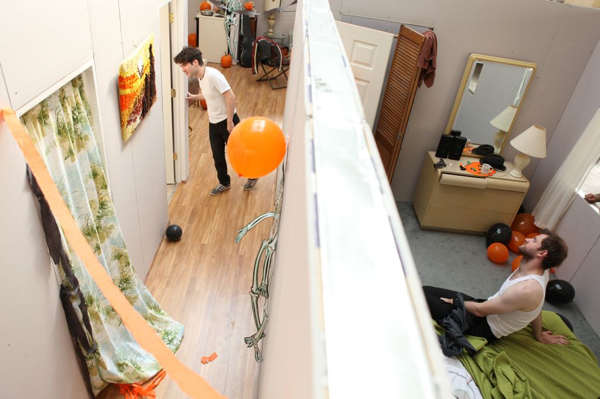Nothing about the promos for David Levine’s “Habit” sounded too exciting. It was billed as another one of those immersive environments, this time inhabited by a few actors repeating the same mundane tasks. An attraction, on an extreme scale, with an even more convincing set than last time. Not again.
This was not that, as you quickly glean from the dialogue from the one-act play that Levine commissioned from experimental playwright Jason Grote. Two rotating casts perform the play, roughly 90 minutes, on a loop, for eight hours straight, ten days in a row. Visitors watch them through the window frames and doorways of a fully-functional, open-air, single-level house designed by Marsha Ginsberg; the exterior’s stripped, but inside is a perfectly shabby home, the morning after a pre-Halloween party. The cast improvises staging (baking, blowing coke, showering, watching TV) with outfits in constant flux (shirts on/off, open sports jackets, a cheetah skirt that barely does the job). As I peeked through the bathroom window at an ankle on a bed, actor Matthew Stadelmann, playing Mitch, posed the question I was already wondering:
What does it mean that we’re doing it, even though we’re not really that into it?
How do you know you’re not really into it?
I dunno. But what do you think it means?
At this point, Mitch is asking Viv why they bother with the Halloween decorations. They’re important to Doug, Mitch’s one-dimensional coke dealing older brother who snaps at Mitch throughout the play to get the fucking decorations up.
After several telling interactions, the play resolves in all, a few, or no one getting shot, depending on which version the actors choose. Viv, who likes to bring up semiotics and Nietzsche, has come back home from college— where we later learn that she’s been kicked out after getting gang-raped. She’s sexually aggressive with Mitch, an unoriginal poet/songwriter who just got fired from Wal-Mart. Doug, who had sex with Viv the night before, relentlessly lays into Mitch, prompting Mitch to reveal a terrible secret about their childhood, which pushes Viv over the edge. Viv reveals that she came back to this shitty town to kill herself, and pulls out the gun.
I don’t want to spoil the ending, but there isn’t one, and you’ve seen this play before. Levine asked Grote to combine tropes of American realist theater; for we who don’t know much about contemporary theater, it’s something between Raisin in the Sun and The Postman Always Rings Twice, set in an MTV college reality show. This shitty town could just as easily have been in Massachusetts or Arizona.
In keeping with the genre, Grote’s liberal with the winks. “You know when you put on a mask for Halloween, you’re actually taking the mask off,” Viv tells Mitch, and later, to Doug, “Stop. You’re performing.” And later: “You know what’s great about you, Doug? What you see is what you get.”
If this is about method acting, it harks back to Levine’s 2007 play Bauerntheater, in which he asked an American method actor to plant an entire field of potatoes for ten hours a day in character, in rural Germany. Here, actors improvise the ending and the staging, but it’s all the same, and they’re still stuck in this shit house.
The result is convincingly brilliant. We look at the construct of the characters, the play, the set, the audience as part of the play, and the actors themselves, when and how Levine directs us.
You’ll veer into determinism there. It seems to apply just as much to the fact that they’re trapped in the lower middle class as it does to theater. “We are the children of slaves,” Viv declares, reciting Nietzsche as she waves the gun over Doug’s head.
So maybe it’s incidental when several moments suggest a real emotional core, like the five-minute shift from its catastrophic end to the bursts of laughter in the beginning (Viv and Doug catch Mitch fucking a pumpkin). When I came back in the seventh hour of the play’s final night, the cast was frying under the stage lights—Mitch had just pulled a cake out of the oven, which couldn’t have helped—and they were doing a tremendous job of fighting the strain. When Eliza Baldi, as Viv, improvised a silent sob after changing from fur coat to spaghetti strap dress, it was painful to watch. Character and performer became one.
And you do, too. They bake food, shower, dress and undress, joke, cry; I went home and did the same. I did feel like an actor. I’m not satisfied with that ending, but what else could I say?
“Habit” was co-presented by the French Institute Alliance Française (FIAF) and Performance Space 122 (PS122) as part of the Crossing the Line festival.



Comments on this entry are closed.